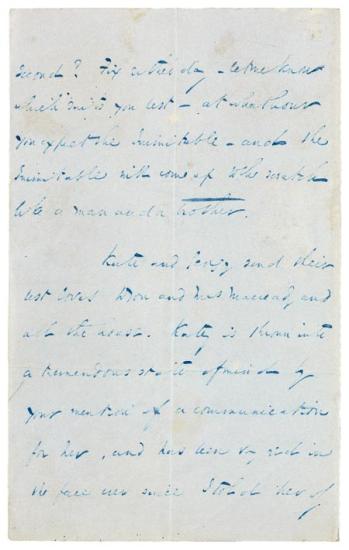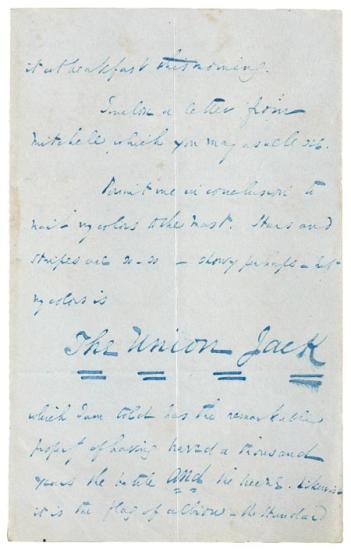Letter 10 | 26 August 1848 | to William Charles Macready, page 1

Autograph letter signed with initials, Broadstairs, Kent, 26 August 1848 to William Charles Macready
Acquired by Pierpont Morgan before 1913
Dickens wrote this letter to Macready as the actor prepared to embark on his final acting tour of the United States. Dickens used the occasion to "nail [his] Colors to the Mast" and tell Macready: "There is not a throat in Britain, where its lies and glozings and shortcomings, stick more intolerably than in mine. And, as a general principle, I have no such thing as patriotism about me. But my sentiment is:—Success to the United States as a golden campaigning ground, but blow the United States to 'tarnal smash [eternal ruin], as an Englishman's place of residence." In May 1849, at the Astor Place Theatre, New York, a dispute between rival supporters of Macready and Edwin Forrest, the leading American Shakespearean actor, led to a riot that resulted in twenty-three fatalities.
America
Dickens visited the United States twice, first traveling extensively with his wife from 22 January to 7 June 1842. Twenty-five years later—from 19 November 1867 to 22 April 1868—he returned alone for an exhausting reading tour.
Prior to his first visit, he had "dreamed by day and night, for years, of setting foot upon this shore, and breathing this pure air." He received an unprecedented enthusiastic and extravagant welcome, as befitted the world's first literary superstar. But he soon grew tired of the intrusion resulting from his lionization. After making several vehement speeches in favor of an international copyright agreement that would protect his work from piracy in the United States, he was deeply hurt by the vitriolic response of the American press. His bitter disappointment is recorded in American Notes for General Circulation and his novel Martin Chuzzlewit (1843–44).
When Dickens returned in 1867, his fame, and the adulation it inspired, had intensified. In seventy-six public readings, he performed for more than one hundred thousand people and earned $95,000, equivalent to approximately $1.5 million in today's money.
My Dear Macready.
I was about to write to you when I received your welcome letter.
You know I would come from a somewhat longer distance than this, to give you a hearty God speed and farewell on the eve of your journey. What do you say to Monday the fourth? Or Saturday the
Letter 10 | 26 August 1848 | to William Charles Macready, page 2

Autograph letter signed with initials, Broadstairs, Kent, 26 August 1848 to William Charles Macready
Acquired by Pierpont Morgan before 1913
Dickens wrote this letter to Macready as the actor prepared to embark on his final acting tour of the United States. Dickens used the occasion to "nail [his] Colors to the Mast" and tell Macready: "There is not a throat in Britain, where its lies and glozings and shortcomings, stick more intolerably than in mine. And, as a general principle, I have no such thing as patriotism about me. But my sentiment is:—Success to the United States as a golden campaigning ground, but blow the United States to 'tarnal smash [eternal ruin], as an Englishman's place of residence." In May 1849, at the Astor Place Theatre, New York, a dispute between rival supporters of Macready and Edwin Forrest, the leading American Shakespearean actor, led to a riot that resulted in twenty-three fatalities.
America
Dickens visited the United States twice, first traveling extensively with his wife from 22 January to 7 June 1842. Twenty-five years later—from 19 November 1867 to 22 April 1868—he returned alone for an exhausting reading tour.
Prior to his first visit, he had "dreamed by day and night, for years, of setting foot upon this shore, and breathing this pure air." He received an unprecedented enthusiastic and extravagant welcome, as befitted the world's first literary superstar. But he soon grew tired of the intrusion resulting from his lionization. After making several vehement speeches in favor of an international copyright agreement that would protect his work from piracy in the United States, he was deeply hurt by the vitriolic response of the American press. His bitter disappointment is recorded in American Notes for General Circulation and his novel Martin Chuzzlewit (1843–44).
When Dickens returned in 1867, his fame, and the adulation it inspired, had intensified. In seventy-six public readings, he performed for more than one hundred thousand people and earned $95,000, equivalent to approximately $1.5 million in today's money.
Second? Fix either day—let me know which suits you best—at what hour you expect the Inimitable—and the Inimitable will come up to the scratch like a man and a brother.
Kate and Georgy send their best loves to you and Mrs. Macready and all the house. Katey is thrown into a tremendous state of mind by your mention of a communication for her, and has been very red in the face ever since I told her of
Letter 10 | 26 August 1848 | to William Charles Macready, page 3

Autograph letter signed with initials, Broadstairs, Kent, 26 August 1848 to William Charles Macready
Acquired by Pierpont Morgan before 1913
Dickens wrote this letter to Macready as the actor prepared to embark on his final acting tour of the United States. Dickens used the occasion to "nail [his] Colors to the Mast" and tell Macready: "There is not a throat in Britain, where its lies and glozings and shortcomings, stick more intolerably than in mine. And, as a general principle, I have no such thing as patriotism about me. But my sentiment is:—Success to the United States as a golden campaigning ground, but blow the United States to 'tarnal smash [eternal ruin], as an Englishman's place of residence." In May 1849, at the Astor Place Theatre, New York, a dispute between rival supporters of Macready and Edwin Forrest, the leading American Shakespearean actor, led to a riot that resulted in twenty-three fatalities.
America
Dickens visited the United States twice, first traveling extensively with his wife from 22 January to 7 June 1842. Twenty-five years later—from 19 November 1867 to 22 April 1868—he returned alone for an exhausting reading tour.
Prior to his first visit, he had "dreamed by day and night, for years, of setting foot upon this shore, and breathing this pure air." He received an unprecedented enthusiastic and extravagant welcome, as befitted the world's first literary superstar. But he soon grew tired of the intrusion resulting from his lionization. After making several vehement speeches in favor of an international copyright agreement that would protect his work from piracy in the United States, he was deeply hurt by the vitriolic response of the American press. His bitter disappointment is recorded in American Notes for General Circulation and his novel Martin Chuzzlewit (1843–44).
When Dickens returned in 1867, his fame, and the adulation it inspired, had intensified. In seventy-six public readings, he performed for more than one hundred thousand people and earned $95,000, equivalent to approximately $1.5 million in today's money.
it at breakfast this morning.
I enclose a letter from Mitchell, which you may as well see.
Permit me in conclusion to nail my Colors to the Mast. Stars and Stripes are so-so—showy perhaps—but my colors is
THE UNION JACK
which I am told has the remarkable property of having braved a thousand years the battle AND the breeze. Likewise it is the flag of Albion—the Standard
Letter 10 | 26 August 1848 | to William Charles Macready, page 4

Autograph letter signed with initials, Broadstairs, Kent, 26 August 1848 to William Charles Macready
Acquired by Pierpont Morgan before 1913
Dickens wrote this letter to Macready as the actor prepared to embark on his final acting tour of the United States. Dickens used the occasion to "nail [his] Colors to the Mast" and tell Macready: "There is not a throat in Britain, where its lies and glozings and shortcomings, stick more intolerably than in mine. And, as a general principle, I have no such thing as patriotism about me. But my sentiment is:—Success to the United States as a golden campaigning ground, but blow the United States to 'tarnal smash [eternal ruin], as an Englishman's place of residence." In May 1849, at the Astor Place Theatre, New York, a dispute between rival supporters of Macready and Edwin Forrest, the leading American Shakespearean actor, led to a riot that resulted in twenty-three fatalities.
America
Dickens visited the United States twice, first traveling extensively with his wife from 22 January to 7 June 1842. Twenty-five years later—from 19 November 1867 to 22 April 1868—he returned alone for an exhausting reading tour.
Prior to his first visit, he had "dreamed by day and night, for years, of setting foot upon this shore, and breathing this pure air." He received an unprecedented enthusiastic and extravagant welcome, as befitted the world's first literary superstar. But he soon grew tired of the intrusion resulting from his lionization. After making several vehement speeches in favor of an international copyright agreement that would protect his work from piracy in the United States, he was deeply hurt by the vitriolic response of the American press. His bitter disappointment is recorded in American Notes for General Circulation and his novel Martin Chuzzlewit (1843–44).
When Dickens returned in 1867, his fame, and the adulation it inspired, had intensified. In seventy-six public readings, he performed for more than one hundred thousand people and earned $95,000, equivalent to approximately $1.5 million in today's money.
of Britain—and Britons, as I am informed, never never never—will—be—Slaves!
There is not a throat in Britain, where its lies and glozings and shortcomings, stick more intolerably than in mine. And, as a general principle, I have no such thing as patriotism about me. But my sentiment is:—Success to the United States as a golden campaigning ground, but blow the United States to 'tarnal smash, as an Englishman's place of residence. Gentlemen, air you all charged?—
Affectionately Ever
CD.